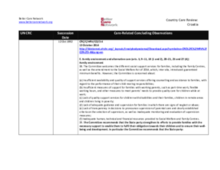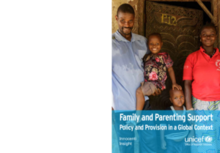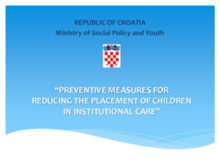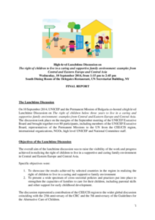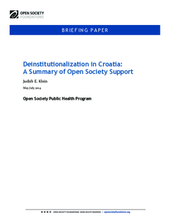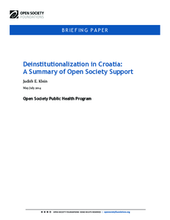Displaying 31 - 40 of 44
This research examined psychological and background correlates of bullying in adolescent residential care. Young people aged 11–21 (N = 601) from 22 residential institutions in Croatia completed an anonymous self-reported bullying questionnaire, the Basic Empathy Scale, the Rosenberg Self-esteem Scale and the Big Five Personality Inventory.
The UN Refugee Agency and UNICEF are setting up 20 centers to support and protect children and families fleeing war and persecution as they move across Europe’s well-worn migration routes. The centers, known as Blue Dot Hubs, are intended to provide a safe place for children and families facing risks once they arrive in Greece and move along the Balkan migratory route, which includes the former republic of Macedonia, Serbia, Croatia and Slovenia. In these hubs, children can play and their families can receive services and counseling.
Meant to highlight the maxim that every child deserves the best that we all have to give; this book provides a review of the progress made since The UN Convention on the Rights of the Child. It contains reports from 21 countries on the status of the rights of the child. The countries are: Australia, Canada, Croatia, Denmark, France, Germany, Greece, India, Iran, Japan, Portugal, Romania, Scotland, Serbia, Solomon Islands, Spain, the Netherlands, the UK, the USA, Uzbekistan and Venezuela. There are no reports from Africa.
This country care review includes the care related Concluding Observations adopted by the Committee on the Rights of the Child and the Committee on the Rights of Persons with Disabilities.
This report examines and analyses policies and provision for family support and parenting support based on general literature searches and evidence gathered from 33 UNICEF national offices and detailed case studies of nine countries.
On 10 September 2014, UNICEF and the Permanent Mission of Bulgaria co-hosted a high level Lunchtime Discussion on The right of children below three years to live in a caring and supportive family environment: examples from Central and Eastern Europe and Central Asia.The discussion took place on the margins of the September meeting of the UNICEF Executive Board and brought together over 80 participants, including members of the UNICEF Executive Board, representatives of the Permanent Missions to the UN from the CEE/CIS region, international organizations, NGOs, high level UNICEF and National Committee staff. Representatives from Croatia presented on preventing institutionalization of children.
On 10 September 2014, UNICEF and the Permanent Mission of Bulgaria co-hosted a high level Lunchtime Discussion on The right of children below three years to live in a caring and supportive family environment: examples from Central and Eastern Europe and Central Asia.
This paper examines the benefits and challenges of de-institutionalizing disability residential services in Croatia through Open Society Foundation’s Mental Health Initiative (MHI).
This presentation from Innocenti’s Expert Consultation on Family and Parenting Support describes the development of parenting support policy in Croatia.
This paper examines the work Open Society Foundations have done in Croatia as part of its Mental Health Initiative (MHI), with the goal of helping people with disabilities return to their communities where they are support

